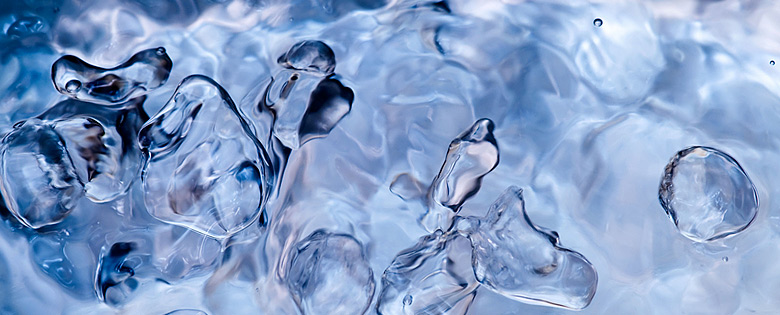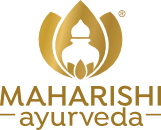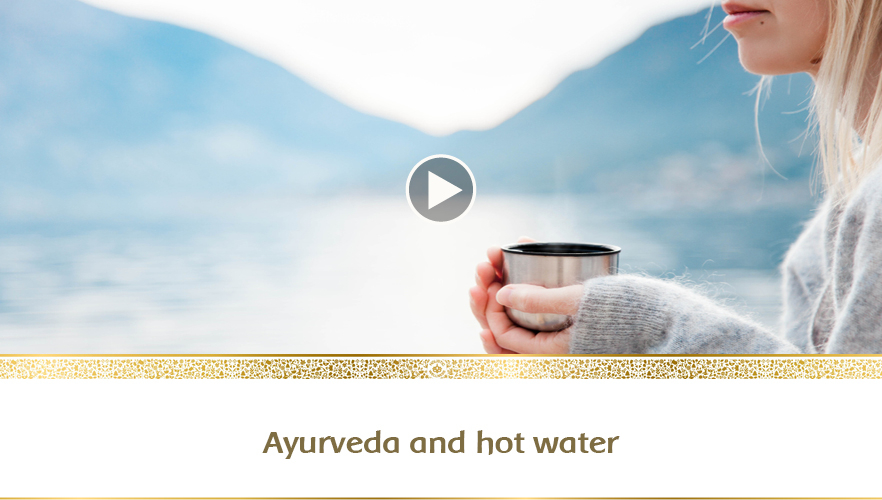
What you should know about hot water
The traditional Ayurvedic texts are full of references to all natural kinds of water. Whether spring water, pond water or rain water – our most important element and its impact on our physical well-being are described in detail.
The main advantages of water from the Ayurvedic point of view:
- It counteracts fatigue
- Water enhances the radiance of the skin
- It prevents digestive problems
- It calms the mind and provides satisfaction
- Water refreshes and is easily absorbed by the body
- Water is life-giving
The purifying qualities of water
Some people have dry skin and unquenchable thirst even though they drink lots of water. The underlying cause may be very weak agni (digestive fire). In addition, ama (metabolic residues, see Note) may block the passage water uses to reach the cells. To enhance moisture absorption, Maharishi Ayurveda recommends boiling the water for some time and, where appropriate, adding spices or herbs to fortify the water.
Why it works
Boiling water enriches it with energy and it gains a quality that in Ayurveda is called sukshma (= penetrating), which allows purification of the subtle channels of the body through deeper penetration into the physiology.
Drinking hot water regularly is a simple Ayurvedic recommendation. Boiling the water for ten minutes stimulates agni directly, allowing food to be processed and absorbed more efficiently during the meal. Taken between meals, it can provide effective support in flushing out water-soluble toxins from the dhatus (body tissues).
Spices have an added effect when boiled for longer in the water, affecting the senses additionally through aroma and taste.
Water for your constitutional type
Why not try out these special water recipes to balance your body type in accordance with the three doshas Vata, Pitta and Kapha.
Vata-balancing hot water
Boil two litres of water for five minutes. Take it off the heat and add 3 leaves of mint, 1/2 teaspoon of fennel seed and 1/4 teaspoon of marshmallow root. Fill a thermos flask with the water and sip it throughout the day. Its temperature should be warm but not too hot.
Pitta-calming hot water
Boil two litres of water for two minutes. Take it off the heat and add 1/4 teaspoon of fennel seed, 2 rose buds and 1 clove. Fill a thermos flask with the water and pour it into a cup before drinking. In summer the water can be enjoyed at room temperature, in winter it can be a little warmer.
Kapha-balancing hot water
Boil two litres of water for five minutes. Take it off the heat and add 3 whole basil leaves, two thin slices of fresh ginger, 1/4 teaspoon of cumin and 1/2 teaspoon of fennel. Pour the water into a thermos and drink it hot or warm in sips throughout the day.
If you do not know your constitutional type, we recommend you take our constitutional type test for initial guidance.
How much water is enough?
According to Ayurveda, how much water you should drink depends on various factors, such as age, workload, stress levels, weather, diet and your constitutional type. The warm Pitta types are generally thirstier than the Kapha types.
Prepare the water in the morning, store it in a thermos flask and drink it every thirty minutes throughout the day.
Water at meals
Ayurvedic texts also recommend sipping plain water at meals. Since Ayurvedic cuisine is already very rich in spices, a drink enriched with herbs might overload the body. On the other hand, if the food is only mildly spiced, then spiced water will support the digestion.
About one cup of water at meals is best, however it depends on what you are eating. If you are eating soup or dhal, for example, you'll need less water. If your food is dryer foods, on the other hand, you'll need more water.
Water should be taken at room temperature or hot, depending on your constitutional type. It should never be ice-cold, as that would almost certainly douse the digestive fire.
If you feel thirsty approximately forty-five minutes after the meal, drink as much water as the body needs for digestion. In between meals you can sip spiced or plain water.

